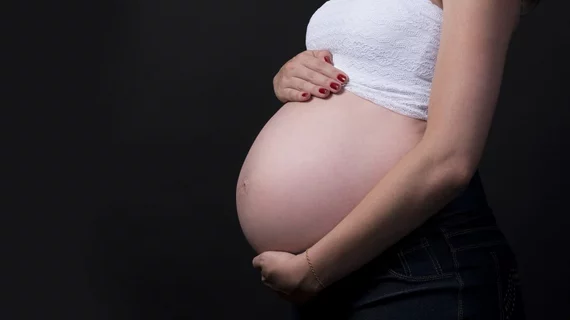Prior cardiotoxicity linked to 30% increased risk of CHF during pregnancy
Women with a history of cardiotoxicity from previous cancer treatments are around 30 percent more likely to experience clinical congestive heart failure (CHF) before, during or after pregnancy, according to research published ahead of print this week in the Journal of the American College of Cardiology.
One of the biggest threats to young, female cancer survivors is cardiotoxicity, Paaladinesh Thavendiranathan, MD, MSc, and co-authors wrote in JACC. If they were treated in the past with chemotherapy or radiation therapy to the thorax, there’s potential for future cardiovascular complications. And since the U.S. sees an estimated 60,000 new cancer cases in young adults each year—the majority of them women—it’s a problem worth paying attention to.
“The reported incidence of CHF associated with pregnancy in cancer survivors has varied from 0 percent to 5.4 percent,” Thavendiranathan, of the University of Toronto, and colleagues said. “However, there has been significant variation in study methods, making interpretation of incidence rates difficult.”
Thavendiranathan et al. recruited 78 women for their own study, all of whom received cancer therapy as children, teens or young adults. Cardiotoxicity in the pool was defined as a reduction in left ventricular ejection fraction (LVEF) to below 50 percent after completion of cancer therapy, with or without CHF.
The team assessed participants’ cumulative 94 pregnancies for a composite outcome of clinical CHF, cardiac death, acute coronary syndrome and sustained arrhythmia. Women were evaluated during and up to 16 weeks after pregnancy, and all results were confirmed by a cardiologist.
According to the study, of 78 women, 55 had received anthracyclines during cancer treatment, while 23 had received nonanthracycline chemo or radiation therapy alone. Thirteen women had experienced prior cardiotoxicity, 12 of whom had been treated with anthracyclines.
Sixteen percent of all pregnancies, or 15 pregnancies total, occurred in those 13 women, Thavendiranathan and colleagues reported. Just four women reached the study’s primary endpoint of CHF, though the incidence of CHF was 31 percent in women with a history of cardiotoxicity. In those without, prevalence of CHF was 0 percent.
The authors said there were no notable differences in age, cancer type or exposure to anthracyclines among women with and without CHF during pregnancy. Women with CHF during pregnancy were more likely to have had a history of cardiotoxicity or LV dysfunction and were more likely to be on cardiac medications.
“We found that the risk of developing CHF during pregnancy is rare in female cancer survivors without a history of cardiotoxicity,” Thavendiranathan et al. wrote. “These women can be reassured that they are at a very low risk of developing CHF during pregnancy.”
Related Cancer Therapy Cardiotoxicity Content:
Succeeding with Cancer: Using Imaging to Avoid Treatment-induced Heart Failure
Providers must rethink traditional imaging approaches to prevent cardiotoxicity in cancer patients
CV programs struggling to keep up with growing demand for cardio-oncologists
Machine learning predicts drug cardiotoxicity
CV outcomes underreported in pivotal anticancer trials
CDK2 inhibitors protect cancer patients from anthracycline-induced cardiotoxicity
Genetic variants could be key to identifying chemo-induced cardiotoxicity
T2 mapping may uncover cardiotoxic marker early enough to prevent heart failure
Some chemo drugs might be more heart-safe than others
Cardiac MRI-derived T2 mapping may help heart failure patients
Genetic variant linked to chemotherapy-induced cardiomyopathy
Study calls for better collaboration between cardiologists, oncologists
Cardiac monitoring may protect high-risk breast cancer patients against heart failure

